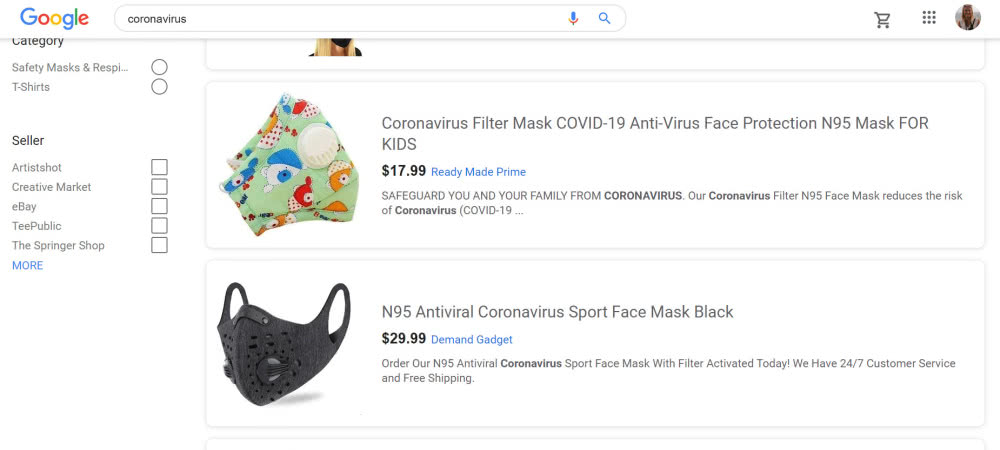Other large tech companies such as Google and Amazon have seen third parties move quickly, using their platforms to try to make money from concerns about the new coronavirus, and have always struggled to stay ahead of the offenders.
Editor’s note: This article comes from Tencent Technology , reviewing Golden Deer.

Figure 1: Google Product Search Ads Showing New Corona Virus Prevention Products
On March 5th, according to foreign media reports, as the new coronavirus pneumonia epidemic continues to spread globally, online advertising on hand sanitizers, gloves, masks and other products that claim to prevent the virus from causing diseases is increasing, Many companies have difficulty implementing policies that prohibit such advertising.
A Google spokesperson acknowledged that as of Wednesday afternoon, Google was also displaying many of these ads, despite its policy prohibiting the dissemination of advertisements about the new coronavirus. Products that promise to prevent the new coronavirus appear in sponsored shopping lists on Google Product Search and in Google display ads on third-party websites.
Other large tech companies such as Google and Amazon have seen third parties move quickly, using their platforms to try to make money from concerns about the new coronavirus, and have always struggled to stay ahead of the offenders. This is the latest example of the fact that operators of large-scale online platforms sometimes lack the tools or personnel to play an endless “hamster” game with those who use these platforms.
For example, Google ’s search for ads for masks promises to “prevent the spread of new coronaviruses” and says that they “get government approval to stop up to 95% of airborne viruses and bacteria, A limited number. ”

Other mask ads claim “limited stock.” Meanwhile, Google ’s shopping results show hand sanitizers, protective clothing, masks and other products that claim to be resistant to the new coronavirus. Google says its shopping rankings are “based on a combination of advertiser bidding and relevance, such as your current search terms and your activity.”
A Google spokeswoman noted that the company has a “sensitive incident policy” on advertising. Under the policy, the company says it prohibits “potential exploitation of incidents such as natural disasters, conflicts, or deaths.” The new coronavirus outbreak “is within the scope of this policy, and we are actively implementing this policy on our platform.”
The spokeswoman also said that the policy also applies to YouTube, which does not allow content creators to monetize videos that handle sensitive events such as the new coronavirus outbreak.
In addition, Google has a “sensitive incident policy” for shopping, which has been “actively implementing” and removing products that violate its policies. The company said it was investigating cases of exposed product ads and removing them as soon as possible.
Google ’s advertising policy on “healthcare and pharmaceuticals” states that it prohibits “non-government-approved products from being sold on the market in a way that implies they are safe or effective in preventing, treating, or treating certain diseases.”
MedicalProtex, Ready Made Prime, Demand Gadget, and OurTechnologyHome were listed as behind-the-scenes in some of the ads, and they did not immediately respond to requests for comment.
Facebook last week banned ads that claimed to prevent or cure new coronaviruses or tried to create a sense of urgency around the epidemic, such as promoting a “limited supply” of a product. In the rush to buy masks in recent weeks, medical experts have tried to warn healthy people not to buy masks so that there is no shortage of equipment for medical staff.
Jerome Adams, director of the U.S. Department of Health, tweeted: “Seriously, don’t buy masks crazy anymore! They can’t effectively help ordinary people to prevent infection with the new coronavirus, but if medical care People cannot take care of patients without them, which puts our community at greater risk! “
Regulators elsewhere are also cracking down on mask-related advertising. According to British media reports, the British Advertising Standards Agency has banned two companies from placing ads on the grounds that they “mislead consumers, are irresponsible, and are likely to cause fear without justified reasons.”
Demand-side platform The Trade Desk says its advertising guidelines do not allow advertisers to useIts platform displays misleading, inaccurate or deceptive advertising. A spokesperson also said: “Our customers are leading brands, such as Fortune 500 companies, and they know the dangers of misleading advertising. Those who want to profit quickly from a crisis will not use our platform.”
Conversant, a digital media company, has also pointed out its policy prohibiting “sensational natural disasters or any false news headlines or stories,” as well as over-the-counter drug ads without FDA approval.